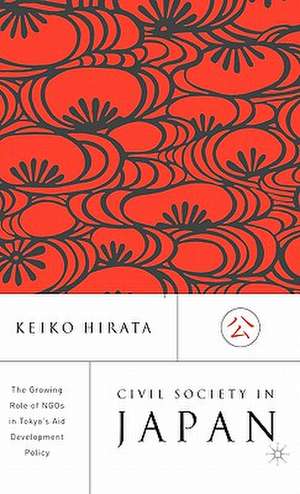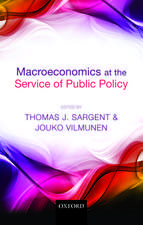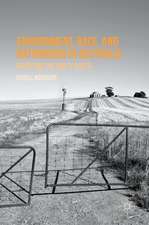Civil Society in Japan: The Growing Role of NGO’s in Tokyo’s Aid and Development Policy
Autor K. Hirataen Limba Engleză Hardback – 5 sep 2002
| Toate formatele și edițiile | Preț | Express |
|---|---|---|
| Paperback (1) | 381.59 lei 43-57 zile | |
| Palgrave Macmillan US – 5 sep 2002 | 381.59 lei 43-57 zile | |
| Hardback (1) | 385.84 lei 43-57 zile | |
| Palgrave Macmillan US – 5 sep 2002 | 385.84 lei 43-57 zile |
Preț: 385.84 lei
Nou
Puncte Express: 579
Preț estimativ în valută:
73.83€ • 77.29$ • 61.09£
73.83€ • 77.29$ • 61.09£
Carte tipărită la comandă
Livrare economică 07-21 aprilie
Preluare comenzi: 021 569.72.76
Specificații
ISBN-13: 9780312239367
ISBN-10: 031223936X
Pagini: 272
Ilustrații: XIII, 208 p. 3 illus.
Dimensiuni: 140 x 216 x 19 mm
Greutate: 0.36 kg
Ediția:2002
Editura: Palgrave Macmillan US
Colecția Palgrave Macmillan
Locul publicării:New York, United States
ISBN-10: 031223936X
Pagini: 272
Ilustrații: XIII, 208 p. 3 illus.
Dimensiuni: 140 x 216 x 19 mm
Greutate: 0.36 kg
Ediția:2002
Editura: Palgrave Macmillan US
Colecția Palgrave Macmillan
Locul publicării:New York, United States
Cuprins
Civil Society and NGOs in Japan Globalization and Pluralism Domestic Crises and Pluralism NGO Advocacy NGO-MOFA Cooperation and Contention in Aid
Recenzii
"This is an important book on an exciting phenomenon in Japanese politics. NGOs are key players in Japan's huge development aid program. Through case studies and an analysis of the broader trends in civil activism in Japan, Keiko Hirata shows NGOs to be new elements in Japan's changing structures of governance. Increasing pluralism within Japan's civil society gives NGOs a key function as issue advocates, policy players and agents of influence in the contemporary Japanese body politic. NGOs represent a new wave of issue-oriented policy intervention, and Hirata has opened up the issue for us in this fresh analysis." - Alan Rix, Professor of Japanese Studies, University of Queensland, Australia
"This book is the first study in English that specifically focuses on the influence of the newly emerging NGO community on Japan's foreign aid policy. Hirata's presents a convincing picture of the dual role played by NGOs as an emerging force in civil society and as new constituents for politicians and bureaucrats. The outcome of the struggle between NGOs as cooperative partners or as contentious gadflies of policymakers in an increasingly pluralistic political setting may have long-term implications not only for aid policy but also for Japan's future foreign policy. This study will therefore appeal to readers interested in both Japan's domestic political developments and its ability to contribute to the international community in the field of economic development." - DennisYasutomo, Professor of Government, Smith College
"This book about NGOs and foreign aid in Japan covers a broad range of hitherto unconnected subjects. . . . In so doing, it challenges several commonly accepted notions. One is the idea that Japanese are invariably deferent to state authority. Another is that the 'Japanese model' is a counter to Western ideas of democracy and citizen activism. And the third, on the other hand, is that NGOs in Japan are always in opposition to, and opposed by, the state. In fact, as Hirata shows, an independent and growing grass-roots citizen activism may be moving Japan closer to Western models of civil society and democracy. . . . This book should be of interest to both specialists and non-specialists alike who are interested in a changing Japan and how its foreign policy gets made." - Professor Ellis S. Krauss, Graduate School of International Relations and Pacific Studies, University of California, San Diego"Civil Society in Japan synthesizes a great deal of recent research in a highly readable way. It will be useful to readers interested in long-term socioeconomic and normative trends underlying state-society relations in Japan on on issues facing contemporary Japanese ODA." - Frank J. Schwartz, Japanese Journal of Political Science
"This book is the first study in English that specifically focuses on the influence of the newly emerging NGO community on Japan's foreign aid policy. Hirata's presents a convincing picture of the dual role played by NGOs as an emerging force in civil society and as new constituents for politicians and bureaucrats. The outcome of the struggle between NGOs as cooperative partners or as contentious gadflies of policymakers in an increasingly pluralistic political setting may have long-term implications not only for aid policy but also for Japan's future foreign policy. This study will therefore appeal to readers interested in both Japan's domestic political developments and its ability to contribute to the international community in the field of economic development." - DennisYasutomo, Professor of Government, Smith College
"This book about NGOs and foreign aid in Japan covers a broad range of hitherto unconnected subjects. . . . In so doing, it challenges several commonly accepted notions. One is the idea that Japanese are invariably deferent to state authority. Another is that the 'Japanese model' is a counter to Western ideas of democracy and citizen activism. And the third, on the other hand, is that NGOs in Japan are always in opposition to, and opposed by, the state. In fact, as Hirata shows, an independent and growing grass-roots citizen activism may be moving Japan closer to Western models of civil society and democracy. . . . This book should be of interest to both specialists and non-specialists alike who are interested in a changing Japan and how its foreign policy gets made." - Professor Ellis S. Krauss, Graduate School of International Relations and Pacific Studies, University of California, San Diego"Civil Society in Japan synthesizes a great deal of recent research in a highly readable way. It will be useful to readers interested in long-term socioeconomic and normative trends underlying state-society relations in Japan on on issues facing contemporary Japanese ODA." - Frank J. Schwartz, Japanese Journal of Political Science
Notă biografică
KEIKO HIRATA received her Ph.D. from the University of Hawaii, Manoa and is currently an Adjunct Professor of Political Science at the University of San Diego.




















